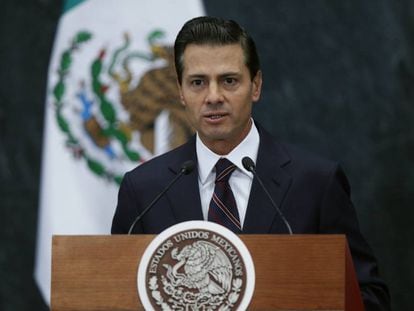US intelligence services issue warning over instability in Mexico
Report cites wealth divide and protectionist atmosphere as dangers for nation blighted by violence

Mexico has entered a new political cycle. While US president-elect Donald Trump is ramping up economic pressure on the country, the economy has stagnated, the currency is in free fall, violence related to the drug trade refuses to go away, and domestic unrest over issues including a hike in gas prices continues to be a fact of life.

In this context, Mexican voters could take a left turn once the current president, the deeply unpopular Enrique Peña Nieto, finishes his current and final term, according to a new report from the US Office of the Director of National Intelligence, a bureau set up in the wake of the 2001 terrorist attacks on the World Trade Center in New York to coordinate the operations of the country’s secret service agencies.
“With presidential elections in 2018 and Peña Nieto limited to one term, voters may lean toward a more leftist opposition that pushes to roll back reforms and trade deals if reforms do not reduce Mexico’s stark economic divide,” the office’s latest Global Trends report states in a clear allusion to Andrés Manuel López Obrador and his left-wing National Regeneration Movement, also known as Morena.
Anti-government protests in Mexico could escalate if wealth is not shared more equally, US intelligence services warn
The report stresses high levels of “public frustration” in the North American region, including Mexico, “because uncertainty about economic conditions and social changes is rising at the same time that trust in most governments is declining.”
While the report’s authors applaud the reform efforts of Peña Nieto’s administration in key industries, as well as hard-fought changes to the education system, in its bid to boost the country’s competitiveness, they note that growth has been subdued and reforms carried out “will probably have muted political impact within the country and region.”
“Antigovernment protests could escalate if the disappointments remain more apparent than the benefits in the next several years,” the report states.
In this context, US intelligence services also warn about the need to pay special attention to the anti-immigrant sentiment displayed during the US election campaign. Without mentioning Donald Trump by name, the analysts behind the report note the campaign “fueled public resentment in Mexico, which could feed into Mexico’s presidential election in 2018.”
During the US presidential elections, Trump warned he would build a wall along the US-Mexico border and announced plans for the mass deportation of up to three million undocumented Mexican migrants who have committed crimes. He also threatened to renegotiate the critical North American Free Trade Agreement (NAFTA) or even scrap the trade deal altogether.
With presidential elections in 2018 and Peña Nieto limited to one term, voters may lean toward a more leftist opposition Global Trends report
Addressing this possibility, the Global Trends report states: “If more protectionist sentiment takes root in the next several years, particularly in the United States and Mexico, the future of trade in the region could be in play.”
“In this atmosphere, an economic downturn in the region could drive some political leaders to take a harder line on trade to reassure publics, even though—as generally agreed among economists—technology and automation have been more important factors in job losses and flat wages and are likely to remain so over the coming years,” the report’s authors state.
English version by George Mills.












































